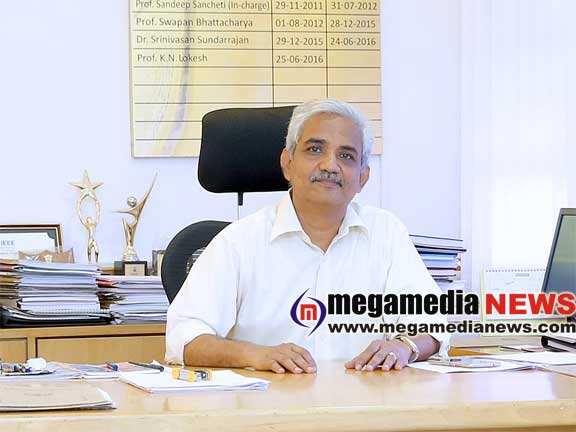‘Private colleges see education as a biz’
11:05 AM, Saturday, October 28th, 2017 Mangaluru: Karanam Uma Maheshwar Rao, director, National Institute of Technology- Karnataka, Surathkal, did mining engineering from Osmania University, Hyderabad. After working in various industries for three years, he joined Indian Institute of Technology, Banaras Hindu University. He acquired his MTech in mining engineering in 1987, and topped the class with a CGPA of 9.38 on 10.
Mangaluru: Karanam Uma Maheshwar Rao, director, National Institute of Technology- Karnataka, Surathkal, did mining engineering from Osmania University, Hyderabad. After working in various industries for three years, he joined Indian Institute of Technology, Banaras Hindu University. He acquired his MTech in mining engineering in 1987, and topped the class with a CGPA of 9.38 on 10.
Rao started teaching as a lecturer in mining engineering at the then Regional Engineering College, Surathkal, DK, Karnataka during 1987-89 and after three decades, he has taken charge as director of the institute.
During the recent Karnataka State Council for Science & Technology meet, you expressed concern about the quality of around 12 lakh engineering who graduate annually in India… Our country needs qualified and skilled manpower, particularly in engineering. There is a credibility gap, the gullibility fill has taken place. If you look at the statistics of IITs, NITs and other central institutions, they have clear-cut modules and quality training. Over the past decade, private engineering colleges have started flourishing. Currently, there are over 4,000 colleges in India, particularly in South India. Barring some colleges, they suffer from many problems in terms of training and obsolete syllabi and they produce unskilled engineers. Private colleges are not equipped to impart education.
The All India Council for Technical Education wants to close down about 800 engineering colleges across India as there are no takers for their seats, and admissions are plunging in these institutions every year. Has the great Indian engineering dream died?
No, it hasn’t. It’s very active. India has a lot of potential for engineering in the years to come. If I go back three decades, all public sector units used to contribute in preparing an engineer. They used to appoint a fresh graduate as graduate engineer trainee for a year and then they conducted an examination. Candidates were observed. However, this is not happening.
There is no training on the job. Only the IT sector trains fresh graduates by spending a large amount of money and so they are flourishing. The gap between education and industry is growing by the day. AICTE has learnt that many colleges want only profits, but have no proper academic syllabus, infrastructure, no lab, no training and so it wants to close them down. Only a degree is awarded at the end of four years. They’re producing unfit engineers. Employability is a big question.
According to AICTE, more than 50%-60% of engineers graduating from technical institutions across the country every year remain unemployed. Where do these graduates end up? Due to lack of training, many with engineering degrees end up in BPO jobs. Such jobs can be done by those have completed PUC or degree.
There is perception that quality is missing in engineering institutions and there is a suggestion to include life skills and real-life problem solving in the curriculum…
I definitely agree, having come from tbe IIT system and now into NIT, which are close to each other. Such is not the system in private colleges today. Every three years, there is a revision of curriculum in NITs and IITs, but not such thing takes place in private colleges. They never call any expert from NITs, IITs or IISc to upgrade their system and still follow obsolete syllabi. We need well-defined curriculum as the world is changing very fast in terms of technology. The entire four-year engineering course is packed. In private colleges, education is seen as a business whereas it’s a service in NIT /IIT /GFTI/ IIITs.
The labour market is changing rapidly due to advances in automation. New jobs will come up but Indian engineers may not be able to take them up. How can graduates make themselves future-proof? Survival is for the fittest. They just have to struggle if they want to exist. Gone are the times where engineering skills once acquired, lasted forever. Now, you have to come back to your alma matter and take up executive programmes.
Soon, NIT-K, Surathkal will be celebrating its diamond jubilee. What’s your plan for the institute?
I want to transform it and make it like the IITs. I want to have a dynamic, flexible curriculum with more stress on hands-on experience. Focus on research and further transfer these ideas to industry. Give more power to startups. Lastly, bring closer alumni which is not happening in NIT-K compared to any other IIT.
Simillar Posts
Warning: count(): Parameter must be an array or an object that implements Countable in /home/megamcaq/public_html/wp-content/plugins/post-plugin-library/common_functions.php on line 357
- None Found
Leave a Reply
© Copyright 2008 www.megamedianews.com All Rights Reserved. Privacy Policy








 Posted in
Posted in  Tags:
Tags: 



